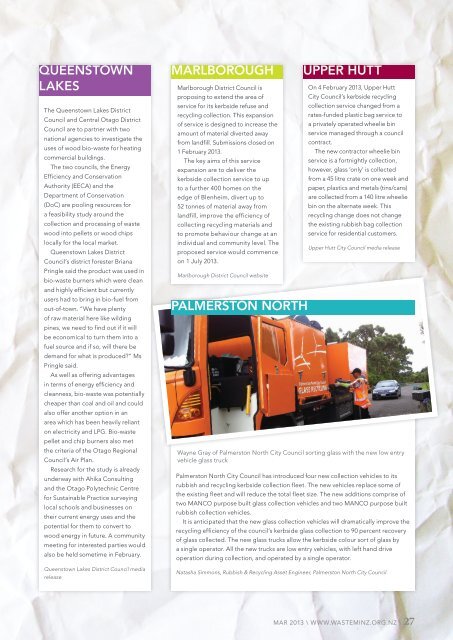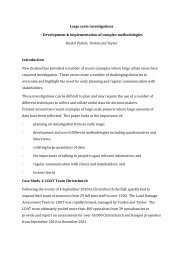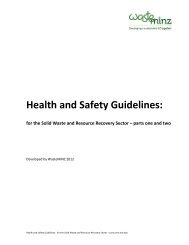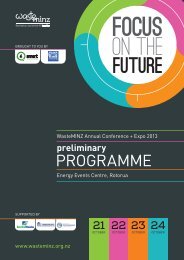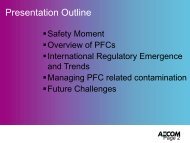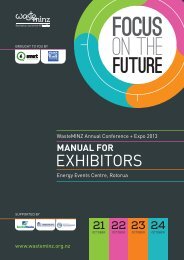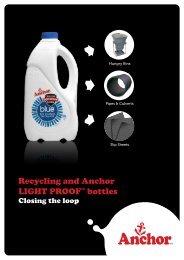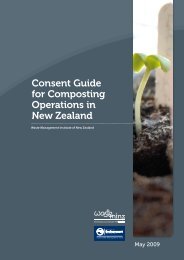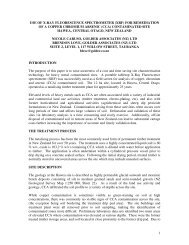Kaibosh
e-WasteAwareness March 2013 - WasteMINZ
e-WasteAwareness March 2013 - WasteMINZ
- No tags were found...
You also want an ePaper? Increase the reach of your titles
YUMPU automatically turns print PDFs into web optimized ePapers that Google loves.
QUEENSTOWN<br />
LAKES<br />
The Queenstown Lakes District<br />
Council and Central Otago District<br />
Council are to partner with two<br />
national agencies to investigate the<br />
uses of wood bio-waste for heating<br />
commercial buildings.<br />
The two councils, the Energy<br />
Efficiency and Conservation<br />
Authority (EECA) and the<br />
Department of Conservation<br />
(DoC) are pooling resources for<br />
a feasibility study around the<br />
collection and processing of waste<br />
wood into pellets or wood chips<br />
locally for the local market.<br />
Queenstown Lakes District<br />
Council’s district forester Briana<br />
Pringle said the product was used in<br />
bio-waste burners which were clean<br />
and highly efficient but currently<br />
users had to bring in bio-fuel from<br />
out-of-town. “We have plenty<br />
of raw material here like wilding<br />
pines, we need to find out if it will<br />
be economical to turn them into a<br />
fuel source and if so, will there be<br />
demand for what is produced?” Ms<br />
Pringle said.<br />
As well as offering advantages<br />
in terms of energy efficiency and<br />
cleanness, bio-waste was potentially<br />
cheaper than coal and oil and could<br />
also offer another option in an<br />
area which has been heavily reliant<br />
on electricity and LPG. Bio-waste<br />
pellet and chip burners also met<br />
the criteria of the Otago Regional<br />
Council’s Air Plan.<br />
Research for the study is already<br />
underway with Ahika Consulting<br />
and the Otago Polytechnic Centre<br />
for Sustainable Practice surveying<br />
local schools and businesses on<br />
their current energy uses and the<br />
potential for them to convert to<br />
wood energy in future. A community<br />
meeting for interested parties would<br />
also be held sometime in February.<br />
Queenstown Lakes District Council media<br />
release<br />
MARLBOROUGH<br />
Marlborough District Council is<br />
proposing to extend the area of<br />
service for its kerbside refuse and<br />
recycling collection. This expansion<br />
of service is designed to increase the<br />
amount of material diverted away<br />
from landfill. Submissions closed on<br />
1 February 2013.<br />
The key aims of this service<br />
expansion are to deliver the<br />
kerbside collection service to up<br />
to a further 400 homes on the<br />
edge of Blenheim, divert up to<br />
52 tonnes of material away from<br />
landfill, improve the efficiency of<br />
collecting recycling materials and<br />
to promote behaviour change at an<br />
individual and community level. The<br />
proposed service would commence<br />
on 1 July 2013.<br />
Marlborough District Council website<br />
PALMERSTON NORTH<br />
UPPER HUTT<br />
On 4 February 2013, Upper Hutt<br />
City Council’s kerbside recycling<br />
collection service changed from a<br />
rates-funded plastic bag service to<br />
a privately operated wheelie bin<br />
service managed through a council<br />
contract.<br />
The new contractor wheelie bin<br />
service is a fortnightly collection,<br />
however, glass ‘only’ is collected<br />
from a 45 litre crate on one week and<br />
paper, plastics and metals (tins/cans)<br />
are collected from a 140 litre wheelie<br />
bin on the alternate week. This<br />
recycling change does not change<br />
the existing rubbish bag collection<br />
service for residential customers.<br />
Upper Hutt City Council media release<br />
Wayne Gray of Palmerston North City Council sorting glass with the new low entry<br />
vehicle glass truck<br />
Palmerston North City Council has introduced four new collection vehicles to its<br />
rubbish and recycling kerbside collection fleet. The new vehicles replace some of<br />
the existing fleet and will reduce the total fleet size. The new additions comprise of<br />
two MANCO purpose built glass collection vehicles and two MANCO purpose built<br />
rubbish collection vehicles.<br />
It is anticipated that the new glass collection vehicles will dramatically improve the<br />
recycling efficiency of the council’s kerbside glass collection to 90 percent recovery<br />
of glass collected. The new glass trucks allow the kerbside colour sort of glass by<br />
a single operator. All the new trucks are low entry vehicles, with left hand drive<br />
operation during collection, and operated by a single operator.<br />
Natasha Simmons, Rubbish & Recycling Asset Engineer, Palmerston North City Council<br />
mar 2013 \ WWW.WASTEMINZ.ORG.NZ \ 27


